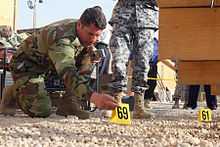Criminal investigation


Criminal Investigation is an applied science that involves the study of facts, used to identify, locate and prove the guilt of a criminal. A complete criminal investigation can include searching, interviews, interrogations, evidence collection and preservation and various methods of investigation.[1] Modern-day criminal investigations commonly employ many modern scientific techniques known collectively as forensic science.
History
Criminal investigation is an ancient science that may have roots as far back as circa 1700 BCE in the writings of the Code of Hammurabi. In the code it is suggested that both the accuser and accused had the right to present evidence they collected.[2] In the modern era criminal investigations are most often done by government police forces. Private investigators are also commonly hired to complete or assist in criminal investigations.
An early recorded professional criminal investigator was the English constable. Around 1250 CE it was recorded that the constable was to "...record...matters of fact, not matters of judgment and law."[3]
References
- ↑ Fundamentals of Criminal Investigation (Sixth Edition). Charles E. O'Hara and Gregory L. O'Hara; 1994; ISBN 0-398-05889-X
- ↑ Victimology:Theories and Applications, Ann Wolbert Burgess, Albert R. Roberts, Cheryl Regehr,Jones & Bartlett Learning, 2009, p. 103
- ↑ Henry of Bratton (1968). Bracton On the Laws and Customs of England; volume 4 pg 136. Cambridge, MS: Belknap Press.
External links
| Wikimedia Commons has media related to Criminal investigation. |